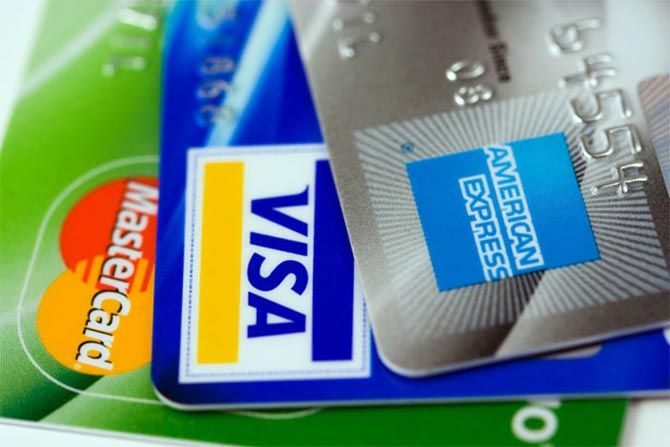'You should be able to juggle them, extract the most rewards out of them, and most importantly, be able to repay your dues on time.'
'However, you shouldn't try to get multiple cards at once,' advises Adhil Shetty, CEO, BankBazaar.com.

In April 2018, the number of credit cards in circulation stood at 37.78 million, up about 50 per cent over the March 2016 figure of 24.50 million credit cards (according to Reserve Bank of India data).
The number of credit card transactions has also risen from 268 million in April 2017 to 333.77 million in April 2018.
Clearly, a larger number of Indians are favouring plastic money in the post-demonetisation era.
Credit cards fulfil several needs, such as instant credit with an interest-free period.
You also get rewards such as cash back and discounts, and subsidised access to your preferred lifestyle.
Imagine getting Rs 8,000 back on the purchase of your favourite smartphone.
Having multiple credit cards can allow you access to a larger set of deals, rewards, and discounts.
Let's examine the case for owning multiple credit cards.
What's the ideal number of cards?
There's no ideal number of credit cards that you should own.
You can own as many as you need, providing you are eligible for them.
You should be able to juggle them, extract the most rewards out of them, and most importantly, be able to repay your dues on time.
However, you shouldn't try to get multiple cards at once.
Rather, stick to one card for a period and use it well.
If you find this card failing to provide you a service essential to your finances, acquire an additional card that does.
Gradually increase the number of cards you own.
Note that each time you apply for a new loan or credit card, an enquiry into your credit history is initiated by the bank or lending institution.
This is what is termed a 'hard' query.
With each hard query, your credit score declines fractionally.
Therefore, several credit inquiries at the same time can damage your credit score.
Hence it is advisable to stagger your credit card or loan applications in a manner that doesn't dent your credit score.
Use the periods between applications to improve your credit score through timely repayments.
- Divide expenses over multiple cards to lower credit utilisation ratio.
- Always pay off the balances on your multiple cards in full and on time.
- Transfer card balance from one to another if it helps lower interest cost.
- Avoid taking cards with benefits that are not useful to you.
- Do not apply for many credit cards within a short span of time as this can adversely impact your credit score.
Enjoy a variety of benefits
Each credit card provides a unique proposition.
For example, one card may provide you complimentary access to golf courses.
Another may provide you sailing lessons.
Yet another may provide you accelerated rewards for shopping with one brand or for sticking to one airline.
The offerings vary from one card to another, and even within the same card segment.
For example, a travel card may annually provide you four complimentary airport lounge visits internationally, while another may offer lounge access only at domestic airports.
Not all of a card's rewards and benefits may be useful to one person.
Therefore, when you get an additional card, ensure that its offerings make an impact on your finances and help you access a lifestyle you aspire to.
With multiple cards that provide you rewards, deals, and discounts in segments of your choice, you can increase your overall gains by transacting through each of them.
Positive impact on credit score
Let's say you have a credit card with a spending limit of Rs 50,000.
You use it regularly and frequently hit your spending limit.
This leads to a high Credit Utilisation Ratio (CUR).
If you spend Rs 20,000 out of your available limit of Rs 50,000, your CUR is 40 per cent.
Credit rating agencies assign heavy weightage to your CUR while computing your credit score.
Therefore, even if you repay your dues in a timely manner, your credit-hungriness is reflected by your frequently high credit card dues. This may bring down your credit score.
Having multiple cards can ease this situation.
Let's say you have two cards each with a spending limit of Rs 50,000.
Instead of spending Rs 20,000 from one card, you can spend Rs 10,000 from each card, thus keeping your overall CUR at just 20 per cent.
The judicious use of multiple cards this way will impact your credit score positively.
Ideally, try to maintain a CUR no higher than 30 per cent for most months.
Greater freedom to spend
Multiple credit cards used together provide you with an enhanced spending limit.
This will be useful in many different situations.
One merchant may not accept the card you have, which makes it useful to have an additional card.
Multiple cards also prove to be handy during a cash crunch where you have a temporary need for money, but don't want to apply for a loan or borrow from friends.
Multiple cards are especially helpful while you're travelling abroad.
You can divide your expenditure over multiple cards and avoid hitting the limit on any one.
In case you were to lose one card for any reason such as loss of baggage or theft, you would have another card to bail you out.
Transfer card balance
If you have pending dues on your credit card, you may consider a transfer of balance.
A new credit card can absorb the balance and allow you to repay it at a lower interest rate.
For example, the first card may charge you 3 per cent a month on your balance, while the new card allows you to pay at 1 per cent for a limited period.
You may have to pay a processing fee for the transfer.
Nonetheless, you may be able to settle your debts at a lower cost this way.
Be responsible when using multiple cards
A credit card comes with a lot of responsibilities.
With each swipe, you borrow money.
It is your legal, financial, and moral obligation to repay what you have borrowed.
There are penalties for being late: Not only do you need to pay late payment fees, you may also have to pay steep interest rates on your card balance.
A monthly interest rate of 3 per cent equals an annualised rate 42.58 per cent.
This makes credit card debt expensive and therefore needs to be repaid without delay.
Also, late payments and defaults will blot your credit history, which lowers your credit score and makes getting new credit cards and loans more difficult.
With multiple credit cards in your hand, you need to be even more careful about how much you are spending on each card and whether you will be able to settle all your dues promptly.
Used with responsibility, multiple credit cards can provide you tremendous spending power, enhanced lifestyle, and the chance to improve your credit history.











